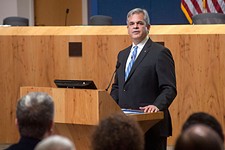Point Austin: How Smart Are We?
Council ponders a bond that voters will swallow
By Michael King, Fri., June 24, 2016

At today's meeting (June 23) City Council is scheduled to discuss and likely vote on whether to place a "mobility" bond proposition on the November ballot. Today's meeting is an informal deadline for that decision, as Council generally abjures formal meetings in July and staff would need time to refine the terms, draft the ballot language, and bring the details back to Council for approval sometime in August. That schedule also leaves less than three months to build public support for the bond – which, under any of the proposals under consideration, would be the largest transportation bond ever put to Austin voters.
The outcome remains very much in doubt. While there is general support on Council for some kind of bond, positions vary widely on its size and focus. There are roughly four proposals under discussion: a $300 million plan recommended by the Mobility Committee, a $500 million version of the same plan offered this week by Council Member Ann Kitchen, a $720 million proposal weighted toward central city alternative modes, by CMs Greg Casar and Leslie Pool – and Mayor Steve Adler's $720 million "Smart Corridors" proposal, which opened the conversation and is a broadly based, citywide initiative that would spread the funds geographically and modally while focusing on major cross-city "corridors" – the "old state highways," as the mayor puts it, which would be transformed with "pullouts and queue jumps for rapid transit, protected paths for bicycles, sidewalks and safe crosswalks for pedestrians, turn lanes and access management for vehicles, and smart signals that we can time remotely in response to weather, special events such as games letting out, collisions, etc."
Easy Come, Easy Go
Initially the mayor wanted only a Council "consensus" – yes or no – but in recent meetings he's more often argued that not "going big" is effectively pointless. For Adler, it's an unhappy coincidence that he enters today's meeting with the simultaneous news that Austin's "Smart City Challenge" for $50 million in federal and private grant support did not succeed. The sting is lessened in that San Francisco and Portland – Austin's national competitors on the techno-hipness scale – also fell short, with the prize going to Columbus (likely for the pledges of $90 million in city and business matching funds).
Entering today's discussions, Adler's plan appears to have more support off the dais than on it. While among the Council only Casar has openly embraced the big dollars (under the mayor's plan or some modification), an unlikely alliance has formed between traditionally poured-concrete devotees like the Chamber of Commerce and the Real Estate Council of Austin, and the multimodal advocates of the Get Austin Moving coalition – e.g., Bike Austin and Bike Share, WalkAustin, conservancy groups, Reconnect Austin, etc. – who believe the larger the plan, the more likely bike, pedestrian, and even mass transit elements will become a part of it. These organized advocates are hardly alone in believing the city's urgent transportation problems require a large response – the open question remains, will the same voters stewing in traffic be willing to pay $720 million to alleviate it?
Judging from recent votes on urban rail and the county courthouse (acknowledging the counter-example of the health care district) there's plenty of bond fatigue in the air, although advocates will insist that the "wrong plans" defeated those projects. Maybe. One could also make the case that council members succumbing to the conservative argument that local "affordability" is primarily a question of tax cuts has inevitably undermined public efforts to invest in necessary infrastructure. Witness the contradictory circumstances of today's meeting: The mayor will be reiterating that less than five dollars a month is not too much to pay for mobility, while he and his colleagues will also be pondering how to kick back about the same dollop of money to homeowners (but not renters) in the form of an expanded homestead exemption.
We're Waiting
My best guess is that Council will come to a grudging consensus on some level of bond proposal – probably closer to that middle $500 million number than the mayor's grand plan – and that it will have to include some of the "regional highway" projects, as well as the local multimodal ones, to have any hopes of consensus today, let alone passage in November. The Statesman, finger in the Downtown wind, has already followed the Chamber and RECA in urging Council to "go big," and it's undeniable that Austin's traditionally small-town, patchwork approach to such efforts is no longer up to the infrastructure needs of a major metropolis.
In any case, as staff has noted, it takes a long time to spend $720 million, and perhaps the idea will at least help Austin's presidential-year voters get accustomed to thinking big about our big city. Having swung and missed on two major bond efforts that would have been important additions to the city's quality of life, perhaps we can come to agreement on a grab bag of major projects to address what we all relentlessly bitch about. Let's see what they come up with, and hope for the best.
Got something to say on the subject? Send a letter to the editor.










